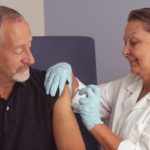1. The first dose of adenoviral-based Oxford-AstraZeneca and Janssen vaccines was associated with acute myocardial infarction and pulmonary embolism.
2. mRNA-based Pfizer-BioNTech and Moderna vaccines were not associated with severe cardiovascular events.
Evidence Rating Level: 1 (Excellent)
Study Rundown: Adenoviral-based (ChAdOx1 nCoV-19 [Oxford–AstraZeneca] and Ad26.COV2.S [Janssen]) and mRNA-based (BNT162b2 [Pfizer–BioNTech] and mRNA-1273 [Moderna]) vaccines have been authorized for the general population to reduce coronavirus disease 2019 (COVID-19) infections. However, numerous studies have revealed unintended associations between vaccination and severe cardiovascular side effects. The present self-controlled case series (SCCS) study used data from the French National Health Data System and COVID-19 vaccine databases to determine the association of the Oxford-AstraZeneca, Janssen, Pfizer-BioNTech, and Moderna vaccines with hospitalization due to adverse cardiovascular events. Myocardial infarction, stroke, and pulmonary embolism were considered. There were no significant associations between Pfizer-BioNTech and Moderna mRNA-based Covid-19 vaccines and adverse cardiovascular events. The first dose of Janssen adenoviral-based vaccine was associated with an increased incidence of myocardial infarction compared to control periods. There was an increased risk of pulmonary embolism and myocardial infarction after the first dose of the Oxford-AstraZeneca adenoviral-based vaccine. However, the magnitude of these positive associations between adenoviral-based vaccines and cardiovascular events is moderate compared to those related to COVID-19 infection. As a limitation, cardiovascular events in outpatient settings could not be included in the analysis as data was not available.
Click to read the study in AIM
In-Depth [case-control study]: The present case-control study used records from the French National Health Data System and COVID-19 vaccine databases to evaluate the associations between adenoviral-based (ChAdOx1 nCoV-19 [Oxford–AstraZeneca] and Ad26.COV2.S [Janssen]) and mRNA-based (BNT162b2 [Pfizer–BioNTech] and mRNA-1273 [Moderna]) vaccines and adverse cardiovascular events. Outcomes included myocardial infarction, stroke, and pulmonary embolism. Data for all adults aged 18 to 74 were collected from the earliest date of vaccine availability (between December 2020 and April 2021 for various vaccines) to July 2021. A modified version of the SCCS method, where each individual served as their own control, was used to estimate the within-individual relative incidence of cardiovascular events for the first and second doses of the vaccine. The three weeks following each vaccination dose were used to assess risk compared to the same individual’s baseline period prior to vaccination. In total, 73,325 adults experienced cardiovascular events during the study period and were used for analysis. There were no significant associations between the Pfizer-BioNTech and Moderna vaccines and any of the cardiovascular events. For the Janssen vaccine, the incidence of myocardial infarction (2.4 events per 100,000 doses) was increased during the second week after the first dose compared to the control period (Relative Incidence [RI], 1.75; Confidence Interval [CI], 1.16 to 2.62). For the Oxford-AstraZeneca vaccine, the incidence of myocardial infarction (1.3 events per 100,000 doses) was increased during the second week after the first dose (RI, 1.28; CI, 1.12 to 1.47). A similar increase in the incidence of pulmonary embolism (0.7 events per 100,000 doses) was found (RI, 1.30; CI, 1.04 to 1.62). This is the most complete study of the adverse cardiovascular effects of the first and second doses of each vaccine individually. These results may help to inform vaccine choice and public health initiatives to address the cardiovascular effects of COVID-19 vaccines.
Image: PD
©2022 2 Minute Medicine, Inc. All rights reserved. No works may be reproduced without expressed written consent from 2 Minute Medicine, Inc. Inquire about licensing here. No article should be construed as medical advice and is not intended as such by the authors or by 2 Minute Medicine, Inc.


